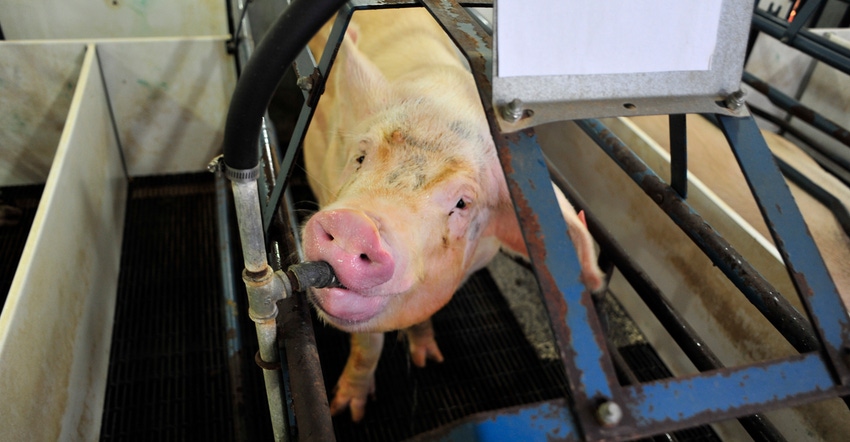April 2, 2021

A common trait of farmers is to keep to themselves mostly concerned with the task at hand on their farm site, their quarter, their section, their community. Too much to do to be real concerned about the outside world.
Of course, this has changed as we have become more of a global economy, as the aforementioned community has grown whether we like it or not. It’s common for us to be tuned into what’s happening in the state next door, especially nowadays with mask mandates, seat belt laws and fluctuating speed limits. But usually, little thought is given to rules and regulations a few states away, especially those on the coasts. Well, all livestock producers better sit up and take notice of what our “friends” in California and Massachusetts are up to.
First, out east Massachusetts voters approved Question 3 back in 2016, requiring that the state’s farmers give chickens, pigs and calves enough room to turn around, stand up, lie down and fully extend their limbs. In addition to requiring more room for sows, hens and veal calves, the measure, if enacted in 2022, would ban the sale of eggs and meat from animals raised in conditions not meeting the set standards.
In 2018, across the country, voters in the Golden State approved Proposition 12 which, if enacted, also would put into play restrictions on the way hens, veal calves and sows are housed, putting specific sizes of housing for each. Language within this statute, also set to go into effect in 2022, says the laying hens, breeding pigs and veal calves cannot be “confined in a cruel manner.” That language in itself is subjective.
California conformation
Like the Massachusetts statute, Prop 12 in California also bans the sale of eggs and meat from animals raised “confined in a cruel manner.” The Californians added language that would also ban the sales of eggs or meat from animals raised in what they deem less-than-ideal conditions, regardless of where the animals were raised.
That’s right, if you raise hogs in Nebraska and hope to sell pork in California, or if you hope to sell eggs from your South Dakota laying hens for California quiches, you have to conform to their standards.
Proponents of both statutes hide behind the label of animal welfare, which we all can get behind. No one wants to see animals harmed, let alone “confined in a cruel manner.” Ranchers and farmers know firsthand how to properly care for their animals. If your livestock aren’t healthy, your operation isn’t healthy.
But these statutes go far beyond animal welfare; the underlying tone of each of these is to run animal agriculture production into the ground. Forcing producers to conform their facilities to meet these standards could be enough to put a lot of producers out of business, especially during these times of production strain brought on by the COVID-19 epidemic.
Each of these statutes are facing challenges in the courts by meat and livestock groups, and it’s time for producers to speak up and get behind these organizations’ activities.
Low-income hit hard
Consumers should also be fighting these statutes, as we’ve all seen premiums have been added to grocery store items boasting this or that claim on their labels.
Back a few years ago, I had the pleasure to interview a Massachusetts woman after she spoke to the National Pork Producers Council delegates at their annual meeting a few months after Question 3 was approved. She felt her state’s voters were duped by the Humane Society of the United States, the drivers behind getting the initiative passed. When the measure was pushed as a measure of animal welfare, Diane Sullivan said in a column I wrote from that interview, “Who wouldn’t get behind that? ... Everyone wants animals to be raised humanely.” Where she did have problems with Question 3 was it appeared to put animal rights ahead of human rights.
There are various reasons for the food insecurity that we continually hear about in this country, and poverty is one of those. These supposedly well-intentioned standards such as Prop 12 and Question 3 are created by people who often don’t have to worry or think about from where or when their next meal is coming.
Sadly, for far too many, those are real concerns.
When such measures as those in California and Massachusetts go into effect, additional costs get passed down to the consumers, which proponents have put at a penny an egg, or 12 cents a dozen. That doesn’t sound like much, but that additional 12 cents for a dozen of eggs gets added to a “little more” for a pound of bacon, on top of all the other additional costs for a low-income family. Those numbers add up really fast.
Far too many other states are joining California and Massachusetts in attempting to tell farmers how to care for their stock. These measures, if approved and enacted, are set to change the way producers operate and how much consumers can afford.
We can all use a hand at making sure our livestock are better cared for, but I would prefer that those hands would have some dirt under their fingernails.
You May Also Like




